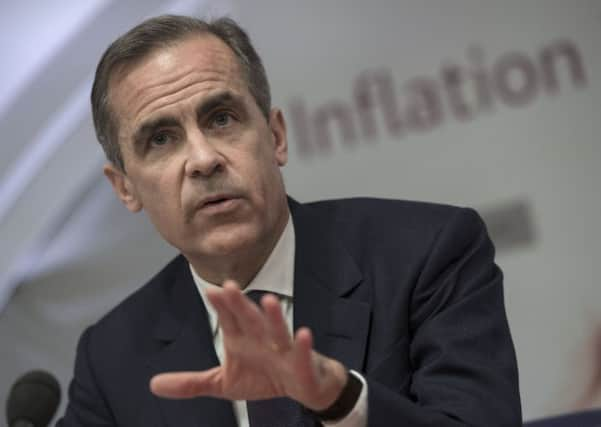UK could face ‘decades’ of low growth


Franklin Templeton investment director Colin Morton predicted the Bank of England (BoE) could keep interest rates at historic lows for the next two years, as Britain’s recovery may have “peaked”.
Mr Morton also questioned the value of the ‘forward guidance’ provided since Bank of England governor Mark Carney took charge of the body, due to the “appalling” accuracy of the Bank’s predictions on rate rises.
Advertisement
Hide AdAdvertisement
Hide AdThe comments come as Mr Carney admitted a rise in the Bank’s base rate from 0.5 per cent may not come as soon as hoped.
Despite earlier indications from that interest rates could rise at the turn of the year, Mr Carney told the Mail on Sunday that it was “not a certainty” - but that it is right to warn consumers if changes could hit their finances.
Mr Morton, who heads up Franklin Templeton’s investment teams in Leeds, told The Yorkshire Post that the UK economy is unlikely to see a boost in the coming months.
He said: “We’re six or seven years into a deleveraging process which may last 25 years - a period of slower growth than we got used to pre-financial crisis.
Advertisement
Hide AdAdvertisement
Hide Ad“There’s still lots of debt out there. We’ve tried to sort things out but all we’ve really done is shuffle the pack.
“The Government’s got lots of debt now, the emerging markets have got lots of debt now, the Europeans have got lots of debt.
“As a result of this, we think interest rates are going to stay incredibly low.
“I don’t think interest rates will go up in the next couple of years.
Advertisement
Hide AdAdvertisement
Hide Ad“I actually think that if anything, the next interest rate move in the UK could be down.”
Last week, the European Central Bank (ECB) startled markets by announcing it could cut the deposit rate and extend its €1.1trn (£790bn) quantitative easing programme in December.
Falling commodity prices and emerging market concerns are weighing on Europe’s economic prospects, and drove consumer prices lower last month.
Similarly, the UK has seen inflation of around zero through 2015, with September’s consumer price index (CPI) turning negative at -0.1 per cent.
Advertisement
Hide AdAdvertisement
Hide AdThis is reflective of the economic environment British companies are working in, Mr Morton said.
He said: “That’s what we see when we see company results coming out at the moment. Things are slowing.
“Things aren’t accelerating out there, things are actually getting worse.”
Official figures are expected to show a slowdown in UK growth when they are released later this week, from 0.7 per cent growth in Q2 to 0.6 per cent in Q3.
Advertisement
Hide AdAdvertisement
Hide AdIn July, the Office of Budget Responsibility downgraded its 2015 outlook to 2.4 per cent, compared to 2.9 per cent growth in 2014.
While the Bank of England would “love” to put rates up, Mr Morton said the move would be “unprecedented” in the current economic environment.
The Bank of England base rate has been at 0.5 per cent since 2009.
Since joining the Bank in 2013, Mr Carney has been accused of sending mixed messages through his ‘forward guidance’, which was intended to avoid shocks for markets and borrowers, who are currently benefiting from rock-bottom lending rates.
Advertisement
Hide AdAdvertisement
Hide AdMr Morton said the accuracy of Mr Carney’s guidance has been “appalling”.
He said: “He’s changed his mind on a regular basis. I’ve got some sympathy, as global economy has been changing rapidly in that period, but it does bring into question what’s the point of forward guidance?
“If you’re trying to give forward guidance and it’s never right, why bother giving forward guidance?”
The Bank of England declined to respond to the comments.
--
Switzerland has predicted its low interest rate environment could last years or possibly decades.
Advertisement
Hide AdAdvertisement
Hide AdMark Branson, head of Swiss financial regulator FINMA told the country’s Schweiz am Sonntag newspaper: “It’s possible that low interest rates could last not only years, but decades. Banks and insurers need to be able to survive in such a situation.”
It follows ECB president Mario Draghi’s announcement last week that its monetary policy committee would consider further quantitative easing at its December meeting.
The ECB hopes action could lift inflation back towards its target of just below two per cent, from its current 0.1 per cent.
European stock markets lifted on the news, but the euro and bond yields were dealt a blow.